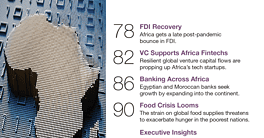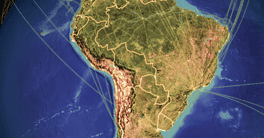Africa’s third-biggest country gets ready for digital financial inclusion.

Egypt is a relatively new player in the blossoming world of fintech, but thanks to recent changes in regulation, the country is making up for lost time and gaining the attention of international investors.
In May, Telda—a Cairo-based application offering online payment services in partnership with Mastercard—made the headlines by raising $5 million, the biggest pre-seed funding round for a fintech in Africa. Sequoia Capital led the investment round, with participation from Global Founders Capital and Class 5. The three California-based global venture capital firms are famous for having backed companies such as Uber, Revolut, Apple, Facebook and Instagram. Telda is Sequoia’s first venture in North Africa.
“Fintech is growing really fast in Egypt,” says Aly Tawfik, head of Growth at Telda. “Everyone wants a piece of it, and it’s just the start. There is a huge potential. We expect plenty of new products and companies to flourish in the next few years.”
Even in the context of a pandemic, several Egyptian fintechs have managed to secure multimillion-dollar deals with foreign investors coming from Arab countries, as well as from Europe, China and the US.
Aside from Telda, significant deals during the past year include payment company Paymob, which raised $18.5 million in a Series A funding round led by Dubai-based Global Ventures in April; Moneyfellows’ $4 million Series A backed by French VC Partech; and digital platform Nowpay, which gathered investors from the US, the UAE and China for its $2.1 million seed round last October.
Several Egyptian fintechs expect to go public in the coming months after postponing their initial public offerings due to the pandemic.
Partnering Up
Newcomers attract a lot of attention from traditional financial services’ players that see an opportunity to reach new customers and increase their market share.
“Fintechs are complementary to the market,” says Walid Hassouna, CEO of the Non-Bank Financial Institutions (NBFI) platform at EFG Hermes, Egypt’s leading investment bank. “In our case, we can create very positive partnerships with those guys.”
In 2018, EFG Hermes established EFG EV, the first fintech accelerator in the country. Since then, it has invested over $4 million in more than 30 different companies. In 2020, it also established a joint venture with PayTabs, one of the MENA region’s leading payment companies.
Egyptian corporates, telcos and insurance companies are also trying to grab a piece of the pie with new incubators and VC funds to support the ecosystem. In April, Cairo-based Algebra Ventures and Sawari Ventures raised the size of their startup funds to $90 billion and $70 million, respectively, with the help of international backers. In March, the co-founder of Fawry, Egypt’s first unicorn, launched a $25 million fintech fund.
From an investor’s perspective, the equation is rather simple: Egypt offers more than 100 million massively underbanked people. Although the number of people with a bank account is rising fast—from 9.7% in 2011 to 32.8% in 2017, according to the latest World Bank figures, Egypt remains well below the regional (43.5%) and global average (68.5%).
“Egypt is undergoing a significant change. There are millions and millions of unbanked businesses and consumers, and we are out there to get them,” says Mounir Nakhla, co-founder of MNT Halan, a Cairo-based microfinance, payments, e-commerce and logistics company that currently serves over four million customers in Egypt and raised around $120 million from regional and global investors in early September.
Most of the unbanked live in rural areas and have very little income—but they do have mobile phones. With over 100 million mobile subscribers, Egypt had 98% mobile penetration as of April 2021.
Currently, between 40% and 60% of Egypt’s economy is informal. Authorities have set financial inclusion as a top priority, and policymakers are pushing to create just the right conditions for the country to leverage new technologies to unleash its full growth potential.
Setting the Rules
Over the past few years, milestone structural reforms initiated by the Central Bank of Egypt (CBE) included the flotation of the Egyptian pound, a new investment law and the promotion of mobile payments and online microcredit. In 2019, the CBE established a road map for the future of digital banking—turning its historic headquarters in central Cairo into a fintech hub with a regulatory sandbox and a 1 billion Egyptian pound ($64 million) fund.
“The general regulatory environment is currently very favorable in Egypt,” says Nakhla. “We are a country that is predominantly cash-based, and there is very clear direction to eliminate cash from the economy.”
The pandemic and repeated lockdowns accelerated the need for digital transformation.
“The pandemic has spurred a renewed reliance on digital payments,” Egypt’s Minister of Finance, Mohamed Maait, told the Oxford Business Group in a recent interview. “This trend is likely to continue after the health crisis and will accompany an uptick in economic growth in 2021.”
In September 2020, the CBE issued a new banking law to strengthen the financial sector. Key changes include an important increase in minimum capital requirements for local and foreign banks, new ownership regulations and compulsory publication of financial data. Law 194/2020 also gives provisions for the CBE to issue digital banking licenses, but this has yet to be implemented. For now, nonbank financial service providers are regulated either by the CBE or the Financial Regulatory Authority, depending on the nature of their operations.
“There is no law that actually regulates fintech as we speak” says EFG Hermes’ Hassouna. “What happened last year is still under implementation by the central bank, but it should be clarified this year and I believe it’s going to help a lot to make Egypt attractive as a hub.”
Bank-Centered Ecosystem
Although the CBE is set to start issuing digital banking licenses soon, it doesn’t mean traditional banks will become obsolete overnight.
According to local media reports, many traditional lenders want to apply for an e-license and have already received tacit approval from the CBE to setup neobanks. In February, for example, Egypt’s second-largest bank, Banque Misr, appointed French tech firm Atos to build it a new digital bank.
“All of the fintech products in Egypt are partnered up with banks. Banks are the core of the industry. The application and products we deliver have a different approach, but you can’t do it without a bank,” says Telda’s Tawfik, who declined to reveal the name of his partner bank until after the official launch of the payment service.
Regional Implications
As Egypt’s fintech ecosystem grows, the country is also gaining momentum vis à vis its neighbors.
“Investment activity in Egypt is continuing to strengthen,” says Philip Bahoshy, founder and CEO of Magnitt, a Dubai-based entrepreneurs’ network and data provider that watches the Egyptian ecosystem closely.
In the Arab world, countries like the United Arab Emirates (UAE), Saudi Arabia, Qatar, Kuwait and Bahrain are ahead of Egypt in policy, regulation and access to funding. In the first half of 2021, the UAE and Saudi Arabia attracted 69% of all funding in the fintech space in the MENA region, while Egypt accounted for 17% of deals.
“Competition is definitely increasing from other hubs in the area, notably in the UAE and Saudi Arabia,” says Hassouna.
“Egypt is innovating, but relative to the other hubs they are lagging behind,” adds Bahoshy.
Although GCC countries are a step ahead, Egypt can hope to outshine its competitors on the African continent. With the recent inflows of foreign investment, Egyptian startups are stealing market share from traditional hubs such as South Africa, Kenya and Nigeria.
A growing number of Egyptian entrepreneurs and banks are also looking to Sub-Saharan Africa to scale operations.
“We are looking at countries that have significant unbanked populations, including a few countries in Africa where we see similarities with Egypt in terms of how the economy is built and the high penetration of smartphones,” says Nakhla.
For now, most Egyptian fintechs specialize in payments, money transfer and lending—but industry experts hope that new regulations will allow the sector to boom. If the law permits it, currently untapped segments such as wealth management, cryptocurrencies and capital markets could offer tremendous opportunities for entrepreneurs.



